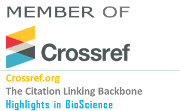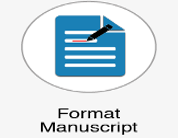The distribution of the ABO and RH blood groups among different populations in the MENA region: A review
Abstract
Keywords
Full Text:
View Full TextReferences
Logdberg L, Reid ME, Lamont RE, Zelinski T. Human blood group genes 2004: chromosomal locations and cloning strategies. Transfus Med Rev. 2005;19(1):45-57.
Logdberg L, Reid ME, Zelinski T. Human blood group genes 2010: chromosomal locations and cloning strategies revisited. Transfus Med Rev. 2011;25(1):36-46.
Basu D, Datta SS, Montemayor C, Bhattacharya P, Mukherjee K, Flegel WA. ABO, Rhesus, and Kell Antigens, Alleles, and Haplotypes in West Bengal, India. Transfus Med Hemother. 2018;45(1):62-6.
Amundadottir L, Kraft P, Stolzenberg-Solomon RZ, Fuchs CS, Petersen GM, Arslan AA, et al. Genome-wide association study identifies variants in the ABO locus associated with susceptibility to pancreatic cancer. Nature genetics. 2009;41(9):986.
El-Zawahri MM, Luqmani YA. Molecular genotyping and frequencies of A 1, A 2, B, O 1 and O 2 alleles of the ABO blood group system in a Kuwaiti population. International journal of hematology. 2008;87(3):303-9.
Landsteiner K. Uber agglutinationserscheinungen normalen menschlichen blutes. Wien Klin Wshr. 1901;14:1132-4.
Sarhan MA, Saleh KA, Bin-Dajem SM. Distribution of ABO blood groups and rhesus factor in Southwest Saudi Arabia. Saudi Med J. 2009;30(1):116-9.
Getta HA, Amin SS, Khoshnaw N, Muhammad BA. Distribution of red cell antigens according to ABO, Rh and other rare blood group systems in Kurdish ethnicity. Iraqi Journal of Hematology. 2016;5(1):55.
Ahmad T, Nadeem M, Khan FU, Uddin S, Maqsood-Ur-Rehman M, Anwar N. Incidence of HBV, HCV and HIV among blood donors from Peshawar KPK, Pakistan. population. 2017;6:19.
Bener A, Yousafzai MT. The distribution of the ABO blood groups among diabetes mellitus patients in Qatar. Nigerian journal of clinical practice. 2014;17(5):565-8.
Bashwari LA, Al-Mulhim AA, Ahmad MS, Ahmed MA. Frequency of ABO blood groups in the Eastern region of Saudi Arabia. Saudi Med J. 2001;22(11):1008-12.
Farshori MP, Al-Muzaini AY, Al-Wakid IH, Ibrahim IKA, ALShammari AF, Alduejieman M, et al. Frequency of distribution of abo and rhesus (Rh) blood group antigens in the female type 2 diabetes mellitus (T2DM) patients in hail region of Saudi Arabia. Integrative Obesity and Diabetes. 2017;3(1):1-6.
Farshori MPQ, Al-Wakid IH, Ibrahim IKA, ALShammari AF, Alduejieman M, Almhanaa AM, et al. Distribution of ABO and Rhesus (Rh) blood group antigens in male type 2 diabetes mellitus patients in Hail region of Saudi Arabia: High incidences of diabetes mellitus in males with B+ blood type. Integr Obesity Diabetes. 2016;2:233-8.
Khalil I, Phrykian S, Farr A. Blood group distribution in Sudan. Gene geography: a computerized bulletin on human gene frequencies. 1989;3(1):7-10.
Urun Y, Utkan G, Cangir AK, Oksuzoglu OB, Ozdemir N, Oztuna DG, et al. Association of ABO blood group and risk of lung cancer in a multicenter study in Turkey. Asian Pac J Cancer Prev. 2013;14(5):2801-3.
Torun YA, Kaynar LG, Karakükcü Ç, Yay M, Kurnaz F, Mutlu H, et al. ABO and Rh blood group distribution in Kayseri province, Turkey. Turkish Journal of Hematology. 2012;29(1):97.
Taha JY. Rh antigen and phenotype frequency in kalba region, UAE. Bahrain Medical Bulletin. 2012;158 (690):1-3.
Cozzi GD, Levinson RT, Toole H, Snyder M-R, Deng A, Crispens MA, et al. Blood type, ABO genetic variants, and ovarian cancer survival. PloS one. 2017;12(4):e0175119.
Trégouët D-A, Heath S, Saut N, Biron-Andreani C, Schved J-F, Pernod G, et al. Common susceptibility alleles are unlikely to contribute as strongly as the FV and ABO loci to VTE risk: results from a GWAS approach. Blood. 2009;113(21):5298-303.
Greer JB, Yazer MH, Raval JS, Barmada MM, Brand RE, Whitcomb DC. Significant association between ABO blood group and pancreatic cancer. World journal of gastroenterology: WJG. 2010;16(44):5588.
Wu T, Ma X-A, Wang G-Q, Li Q, Li M-J, Guo J-Y, et al. ABO blood type correlates with survival in hepatocellular carcinoma following hepatectomy. Scientific Reports. 2017;7(1):4412.
Jassim W. Association of ABO blood group in Iraqis with hypercholesterolaemia, hypertension and diabetes mellitus. 2012.
Jenkins PV, O’Donnell JS. ABO blood group determines plasma von Willebrand factor levels: a biologic function after all? Transfusion. 2006;46(10):1836-44.
Zhou S, Welsby I. Is ABO blood group truly a risk factor for thrombosis and adverse outcomes? World journal of cardiology. 2014;6(9):985.
Franchini M, Capra F, Targher G, Montagnana M, Lippi G. Relationship between ABO blood group and von Willebrand factor levels: from biology to clinical implications. Thrombosis journal. 2007;5(1):14.
Franchini M, Makris M. Non-O blood group: an important genetic risk factor for venous thromboembolism. Blood Transfusion. 2013;11(2):164.
Kamphuisen PW, Eikenboom JC, Bertina RM. Elevated factor VIII levels and the risk of thrombosis. Arteriosclerosis, Thrombosis, and Vascular Biology. 2001;21(5):731-8.
Wiggins KL, Smith NL, Glazer NL, Rosendaal FR, Heckbert SR, Psaty BM, et al. ABO genotype and risk of thrombotic events and hemorrhagic stroke. J Thromb Haemost. 2009;7(2):263-9.
Wolpin BM, Chan AT, Hartge P, Chanock SJ, Kraft P, Hunter DJ, et al. ABO blood group and the risk of pancreatic cancer. Journal of the National Cancer Institute. 2009;101(6):424-31.
Wolpin BM, Kraft P, Gross M, Helzlsouer K, Bueno-de-Mesquita HB, Steplowski E, et al. Pancreatic cancer risk and ABO blood group alleles: results from the pancreatic cancer cohort consortium. Cancer research. 2010:0008-5472. CAN-09-2993.
Melzer D, Perry JR, Hernandez D, Corsi A-M, Stevens K, Rafferty I, et al. A genome-wide association study identifies protein quantitative trait loci (pQTLs). PLoS genetics. 2008;4(5):e1000072.
Oguz A, Unal D, Tasdemir A, Karahan S, Aykas F, Mutlu H, et al. Lack of any association between blood groups and lung cancer, independent of histology. Asian Pacific Journal of Cancer Prevention. 2013;14(1):453-6.
Zhang B-L, He N, Huang Y-B, Song F-J, Chen K-X. ABO blood groups and risk of cancer: a systematic review and meta-analysis. Asian Pac J Cancer Prev. 2014;15 (11):4643-50.
Witkowska AM, Borawska MH. Soluble intercellular adhesion molecule‐1 (sICAM‐1): an overview. European cytokine network. 2004;15(2):91-8.
Kobayashi H, Boelte KC, Lin PC. Endothelial cell adhesion molecules and cancer progression. Current medicinal chemistry. 2007;14(4):377-86.
Liumbruno GM, Franchini M. Hemostasis, cancer, and ABO blood group: the most recent evidence of association. Journal of thrombosis and thrombolysis. 2014;38(2):160-6.
DOI: https://doi.org/10.36462/H.BioSci.20221
Refbacks
- There are currently no refbacks.
Copyright (c) 2020 Zaid and Mustafa

This work is licensed under a Creative Commons Attribution 4.0 International License.
...........................................................................................................................................................
Other "Highlights in" Journals
Highlights in Bioinformatics, Highlights in Chemistry, Highlights in Science, Highlights in Microbiology, Highlights in Plant Science
........................................................................................................................................
International Library of Science "HighlightsIn" is an Open Access Scientific Publishers, aiming to science and knowledge support













